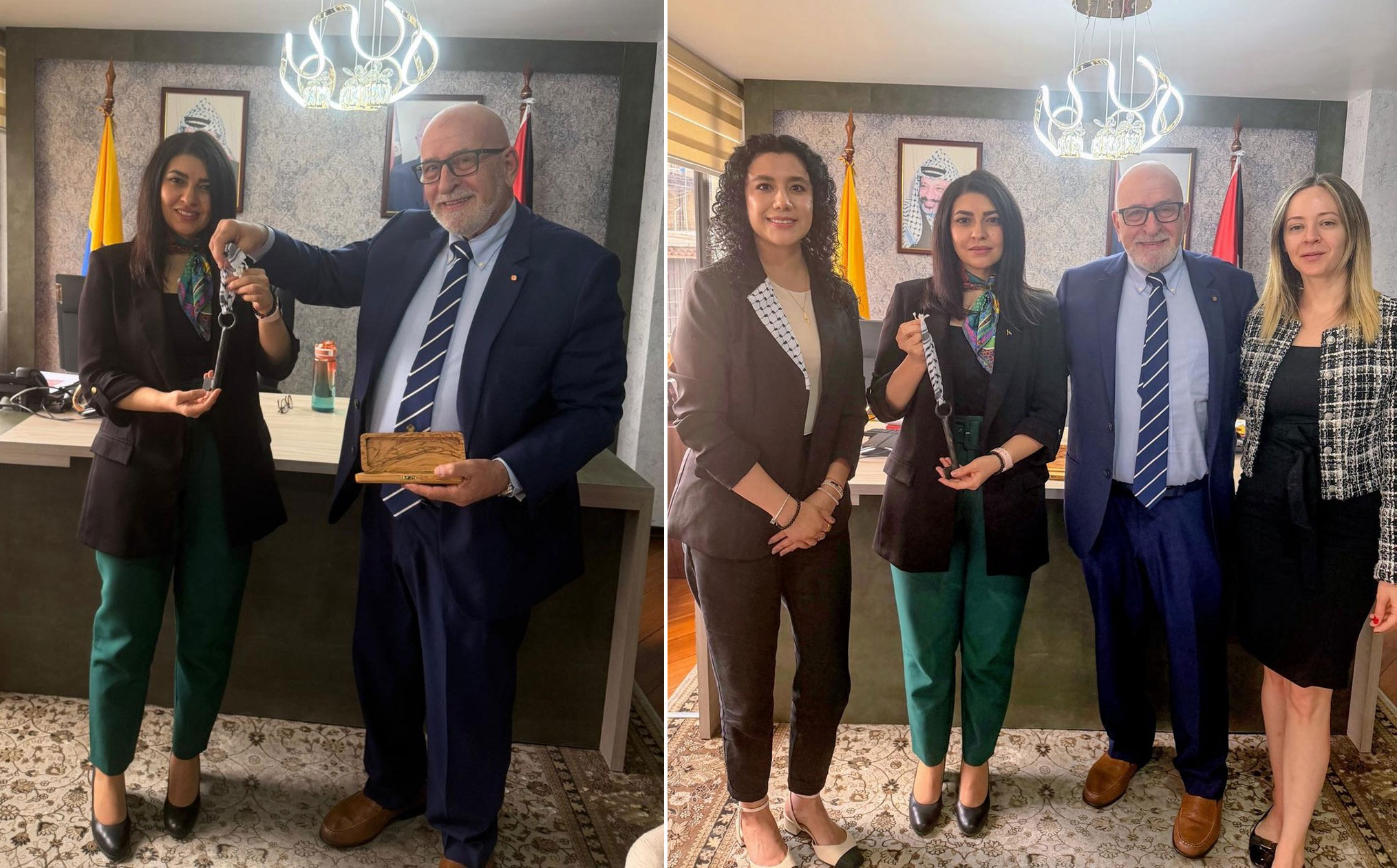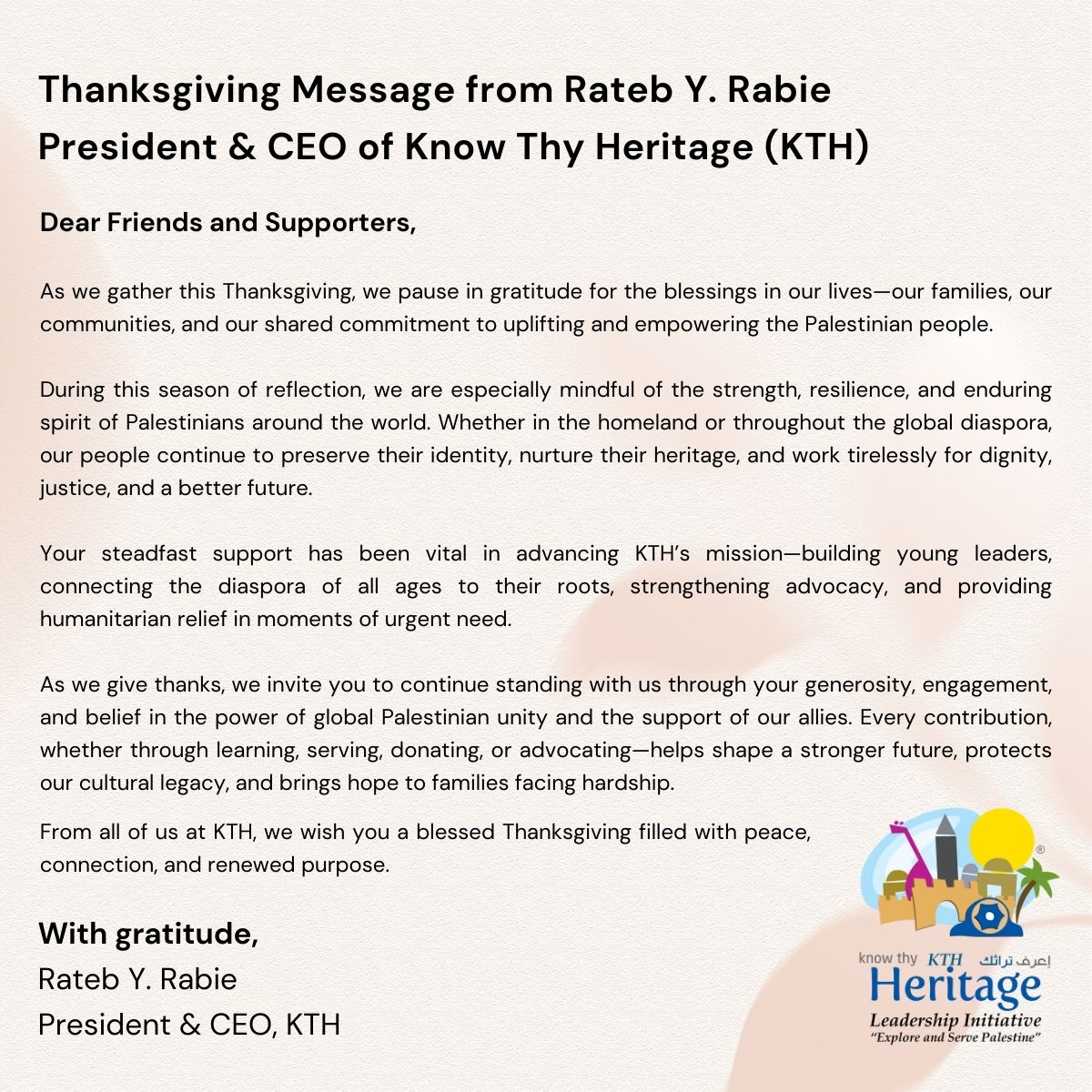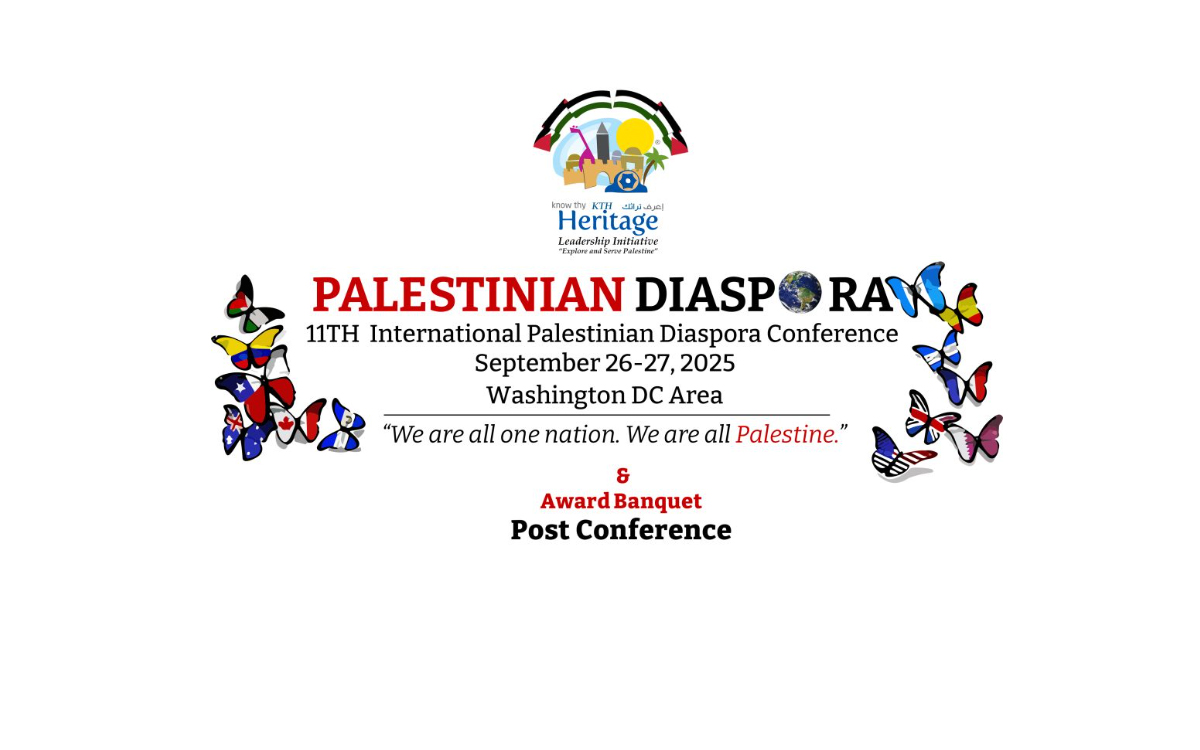KTH Strengthening Connections with the Palestinian Ecuadorian Diaspora and the People of Ecuador
Quito, Ecuador – November 1, 2025 – The President and CEO of Know Thy Heritage (KTH), Sir Rateb Rabie, recently visited Ecuador as part of KTH’s ongoing mission to empower the Palestinian diaspora—particularly youth—by deepening their connection to Palestinian identity, culture, and history.
The visit aimed to engage the local Palestinian-Ecuadorian community, foster leadership, and promote KTH’s initiatives advocating for Palestinian rights, cultural preservation, and active diaspora involvement, while also strengthening Ecuadorian solidarity for justice and peace in support of a sovereign Palestinian state.
Diplomatic Engagement and Strengthening Partnerships
During his visit, Sir Rateb met with H.E. Ms. Safaa Mhalwes, Chargé d’Affaires of the State of Palestine in Quito, who has served in this role since May 2025. Ms. Mhalwes has been instrumental in representing Palestinian interests and deepening diplomatic relations between Palestine and Ecuador. Her work has significantly advanced the Palestinian cause and enhanced Ecuador’s understanding and engagement with Palestinian perspectives.
Their discussion focused on enhancing collaboration with the Palestinian diaspora, developing joint initiatives, and promoting KTH’s signature program, the Leadership Initiative – “Explore & Serve Palestine.” Known as the Palestinian Birthright, this transformative experience invites young Palestinians aged 18–35 to visit and explore Palestine from June 25 to July 9, 2026.

the Key of Palestine was presented to H.E. Ms. Safaa Mhalwes.
“This distinguished honor, bestowed by KTH, embodies the enduring spirit and unbreakable bond between Palestinians and their homeland. The Key represents the collective dreams of the Palestinian diaspora and their unwavering belief in justice, freedom, and the eventual return to their rightful land. It is traditionally awarded to KTH alumni and individuals whose hearts, minds, and actions exemplify steadfast dedication to the Palestinian cause and the advancement of the rights and dignity of the Palestinian people.”
Sir Rateb highlighted KTH’s role as a global platform uniting Palestinians of all generations, inspiring youth to reconnect with their roots, and encouraging them to contribute to a vibrant and resilient Palestinian future. He also invited the Ecuadorian community to join the growing network of more than 450 KTH alumni from 25 countries who have gained firsthand experience of Palestine’s rich history, culture, and contemporary life under occupation.
Empowering KTH Alumni and Local Advocates
Also present at the meeting was Ms. Nicolle Masou, Third Secretary at the Palestinian Embassy and a proud KTH alumna, who was inspired to pursue a career in diplomacy after joining the KTH 2016 Delegation to Palestine. Her story reflects the transformative power of KTH’s mission in motivating young Palestinians to serve their homeland and communities worldwide.
The meeting was also attended by Mrs. Rocio Rabie, an Ecuadorian advocate and long-time supporter of KTH’s initiatives. Mrs. Rabie has been involved with the organization since its inception, helping to promote greater understanding and partnership between Ecuadorians and Palestinians.
Outreach to Ecuadorian Communities and Institutions
Sir Rateb continued his visit by meeting with Ecuadorian community leaders across various sectors, including human rights, business, economics, and sports—a field that holds deep cultural significance in Ecuador. These interactions underscored Ecuador’s longstanding commitment to international solidarity and its enduring support for Palestine.
He noted that while Ecuador’s sympathy for the Palestinian cause remains profound, there is still much to be done to transform that goodwill into structured, impactful, and sustainable collaboration.
Historically, Ecuador has maintained one of the most pro-Palestinian foreign policies in Latin America, particularly under President Rafael Correa (2007–2017), who officially recognized the State of Palestine in 2010. Building on this legacy, Sir Rateb’s visit sought to strengthen cooperation, foster dialogue, and encourage joint efforts toward peace, justice, and mutual understanding between both peoples.
Origins of Palestinian Immigration to Ecuador
Palestinian immigration to Ecuador began between 1880 and 1930, during the decline of the Ottoman Empire. Political unrest, economic hardship, and military conscription in Palestine drove many—mostly Christian Palestinians from Bethlehem, Beit Jala, Beit Sahour, Ramallah, and Jerusalem—to seek new opportunities abroad.
Many traveled by ship from Haifa or Beirut, often stopping in Central America before settling in Ecuador, Chile, or Colombia, guided by family and business networks. In Ecuador, they primarily settled in Guayaquil, Quito, and Cuenca, starting as street vendors and merchants selling textiles and household goods. Through determination and entrepreneurship, they built successful family businesses that became vital contributors to Ecuador’s economic growth.
While integrating into Ecuadorian society, Palestinians preserved their Arab heritage, Christian faith, and community traditions. Family gatherings, church activities, and social networks kept their cultural identity alive, enriching Ecuador’s diverse and multicultural fabric.
Conclusion: Building Bridges for the Future
Sir Rateb’s visit reaffirmed KTH’s unwavering commitment to connecting Palestinians worldwide, empowering diaspora youth, and fostering meaningful partnerships with local communities. In Ecuador, these efforts symbolize a renewed chapter of cooperation—one that honors the shared values of faith, resilience, and justice that unite Palestinians and Ecuadorians.
Through initiatives like “Explore & Serve Palestine” and continued outreach efforts, KTH stands as a bridge between heritage and hope, ensuring that the spirit of Palestine continues to thrive across generations and continents.




